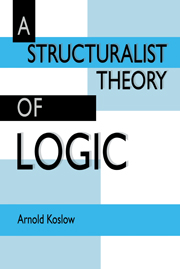Book contents
- Frontmatter
- Contents
- Preface
- Part I Background
- Part II Implication relations
- 5 The theory of implication relations
- 6 Implications: Variations and emendations
- 7 Familiar implication relations: Deducibility and logical consequence
- 8 Implication relations: Direct and derived
- 9 Implications from implications
- 10 Implication relations and the a priori: A further condition?
- Part III The logical operators
- Part IV The modal operators
- Appendix A An implication relation for the integers in the programming language BASIC
- Appendix B Symmetric sequents as products of implication relations and their duals
- Appendix C Component-style logical operators and relevance
- Notes
- Bibliography
- Index
5 - The theory of implication relations
Published online by Cambridge University Press: 05 May 2010
- Frontmatter
- Contents
- Preface
- Part I Background
- Part II Implication relations
- 5 The theory of implication relations
- 6 Implications: Variations and emendations
- 7 Familiar implication relations: Deducibility and logical consequence
- 8 Implication relations: Direct and derived
- 9 Implications from implications
- 10 Implication relations and the a priori: A further condition?
- Part III The logical operators
- Part IV The modal operators
- Appendix A An implication relation for the integers in the programming language BASIC
- Appendix B Symmetric sequents as products of implication relations and their duals
- Appendix C Component-style logical operators and relevance
- Notes
- Bibliography
- Index
Summary
Conditions on implication
In Part I we outlined a program for the logical operators that has two components, one consisting of implication relations, the other consisting of characterizations of the logical operators relative to these implication relations. If we think of an implication structure I = 〈S, ⇒〉 as a nonempty set S together with an implication relation “⇒” on it, then the logical operators are functions that on each implication structure assign (sets of) elements of it that count as hypothetical, conjunctions, negations, disjunctions, quantifications, and so forth, of that structure. Thus, the general picture is one in which the logical operators are relativized to implication relations, and each one is specified without recourse to any of the operators to be characterized. Otherwise the program would be circular from the outset.
Our present concern, then, is the study of implication structures, nonempty sets with implication relations on them. We have described implication relations (on a set S) as any finitary relation on S (which we write with a double arrow) that satisfies the six conditions specified in Chapter 1. Any relation will count for us as an implication relation if it satisfies these conditions. Some of these conditions follow from the others, but we shall retain the less elegant formulation for the sake of greater perspicuity.
Information
- Type
- Chapter
- Information
- A Structuralist Theory of Logic , pp. 35 - 38Publisher: Cambridge University PressPrint publication year: 1992
